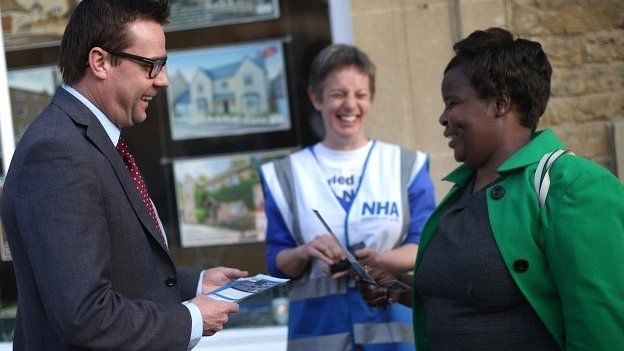Election 2015: A party with a prescription for the NHS?
- Published

Dr Clive Peedell out campaigning in David Cameron's constituency
The future of the NHS has been one of the major topics of the election. The Tories, Labour and the Lib Dems have all been promising more money and better services.
But according to one party, which should in theory be best qualified to talk about the health service, the mainstream politicians are living in "cloud-cuckoo land".
The National Health Action Party, set up in 2012 by doctors, nurses and paramedics in opposition to the coalition's health policy, is fielding 12 candidates next week.
Its co-leader Clive Peedell, a cancer doctor from Middlesbrough, is standing against Prime Minister David Cameron, while another candidate, London GP Dr Louise Irvine, is fighting Health Secretary Jeremy Hunt in his South West Surrey seat.
Co-leader Dr Richard Taylor, who won the Wyre Forest seat in 2001 off the back of a campaign to save Kidderminster Hospital's A&E department, is also standing.
More money
Dr Peedell says the promises of extra money by the parties have been made on the basis of the NHS making more than £20bn of efficiency savings over the next five years to make up a £30bn shortfall.
'The chance of achieving this is almost impossible, and the parties are living in cloud-cuckoo land if they think it can be done," he says.
Instead, his party says the NHS should get an immediate £4.5bn cash injection followed by cash rises of 4% a year. If inflation stays low, this would probably cover the entire £30bn, negating the need for efficiency savings.
Dr Peedell says that does not mean savings cannot be made. The party believes £4.5bn a year can be saved in bureaucracy by dismantling the market structures, while there is potential for another £2bn from renegotiating private finance initiative (PFI) hospital deals (something experts say is notoriously difficult).
Another reorganisation?
This would involve a repeal of the 2012 Health and Care Act, but - and this is where the party differs from Labour, which is also promising such a move - Dr Peedell would go further and end the purchaser-provider split in the health service.
This is the system whereby services are paid per patient treated, which was introduced to encourage internal competition in the health service. "It is the elephant in the room, that is damaging the NHS," Dr Peedell says.
But if this happens, where would the stick and carrot be? He agrees there needs to be some control and incentivisation.
"If you get rid of the purchase-provider split, you can actually do less work and get away with it," he says.
Q&A: Health and care - the background issues
But he favours greater public accountability, with patients and local politicians forming bodies that could "hold the NHS to account".
And he likes the idea of external peer review, which is used in cancer care, whereby teams from other sites come to inspect performance.
Investment
The party's manifesto, launched last week, proposes:
free prescriptions
free personal care for help such as washing and dressing
10,000 extra GPs
The NHA Party was founded in 2012 in opposition to the government's health policy
Along with the savings already mentioned, this would all be paid for by:
putting 1p more on the basic rate of income tax
raising the upper rate from 45p to 50p
introducing a financial transaction tax of between 0.1% and 0.5%
This leaves plenty over, Dr Peedell says, for non-NHS policies, including the scrapping of tuition fees and the renationalisation of the railways.
He says: "We want to be taken seriously, and so we have made sure we have the money to pay for what we want to see happen."
Election chances
So, what about his own and his party's chances? As with everyone standing for election, it is a question that has been put to him on countless occasions.
He admits he personally does not have "a lot of a chance" against the prime minister.
But he says "being optimistic" the party could conceivably end up with two seats, although he is conscious that that is a "long-shot".
"When we set up our aim was to get the NHS as the number one issue in the election," Dr Peedell says. "And it probably is. Of course that's not all down to us, but we have played a part."
So what happens after election day? "I'm on call! But I'll need a rest," says Dr Peedell. "It's tough trying to combine this with working, but we will continue.
"As a front-line worker you see the problems there are in the system - that is why we all want to carry on with the National Health Action Party and build on what we have achieved."
* Election candidates standing in Witney: Colin Bex (Wessex Regionalists); David Cameron (Conservative); Duncan Enright (Labour); Andy Graham (Liberal Democrat); Nathan Handley (Independent); Deek Jackson (Land Party); Stuart Macdonald (Green); Clive Peedell (National Health Action Party); Vivien Saunders (Reduce VAT in Sport); Bobby Smith (Give Me Back Elmo); Simon Strutt (UKIP) and Chris Tompson (Independent).
* Election candidates standing in South West Surrey: Patrick Haveron (was Liberal Democrat candidate but has been suspended by party); Jeremy Hunt (Conservative); Louise Irvine (National Health Action Party); Howard Kaye (Labour); Paul Robinson (Something New); Susan Ryland (Green) and Mark Webber (UKIP).
* Subscribe to the BBC Election 2015 newsletter, external to get a round-up of the day's campaign news sent to your inbox every weekday afternoon.
- Published23 April 2015
- Published22 April 2015
- Published30 March 2015